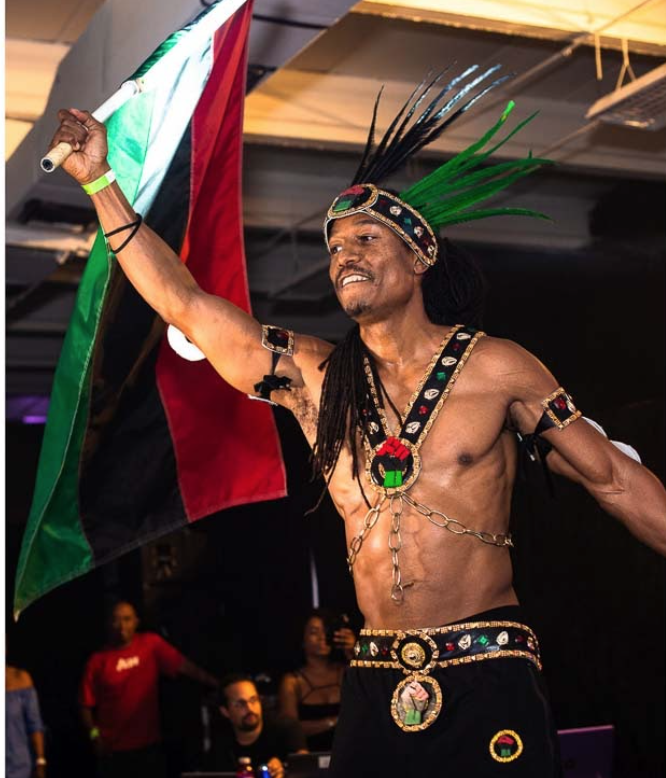1. Tell us a little about yourself and your journey in the culture and carnival.
I got introduced to carnival & soca music in 1999. I was invited to Caribana by some friends from college (Rutgers U). The first fete I went was life changing. The energy of the crowd, the live bands mashing it up on stage (Square One, Xtatik, Traffic, Blue Ventures, Krosfyah, etc.), and the pure feeling of joy in the crowd was completely unexpected and unfamiliar to me. I became a quick learner and had the time of my life in Toronto. Two months later, we went to Miami Carnival. Since then, I have gone to at least 1 carnival a year for over 20 years.
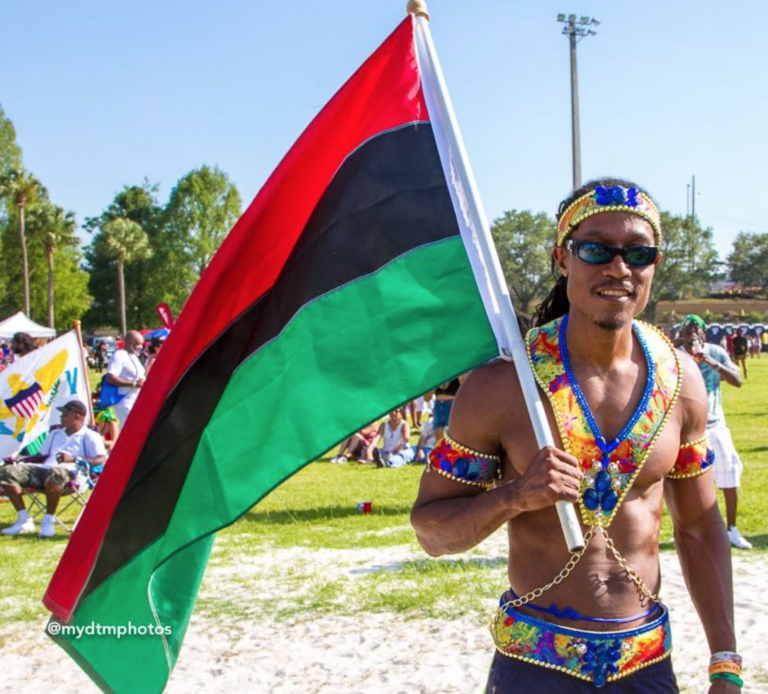
2. What made you adopt the wear of the Pan-African flag at carnivals and fetes?
One of the first things I noticed about carnival culture is the tremendous national pride people displayed, mostly in the for of country flags. Flags were everywhere and apart of nearly every song that played. I knew I needed to decide which flag to fly. Being African American and “woke” my entire life, thanks mostly to my parents and my community, this decision caused me to face some real issues about how to properly represent myself amongst all the revelers with their flags.
At the time, my most obvious options were to bring an American flag or “borrow” one of my friends frequently offered national flags. Firstly, at no point in my life have I ever associated my nationality with the American flag. I am a citizen of the United States and that is as far as I have ever felt the need to go in that relationship. I believe that flag does represent me, therefore, it does not illicit feelings of national pride for me. To me that flag represents someone else’s independence story and someone else’s national pride not mine. I feel the same way (but from a warmer place in my being lol) about using any of my Caribbean friends’s flags. Therefore, I needed to come up with another alternative.
So I ultimately decided to not carry flag and instead I rolled with rag. From early on I always carried a white towel with me during carnival time. TBH it wasn’t as though I was abstaining on the flag and national identity matter, for me it was a silent protest. I took great pride in the fact that I didn’t feel compelled to carry a flag that I believed did not represent me in the way that I wanted it to. This went on for over 10 years, but that changed when I started actually playing mas.
3. What got you on the road playing mas?
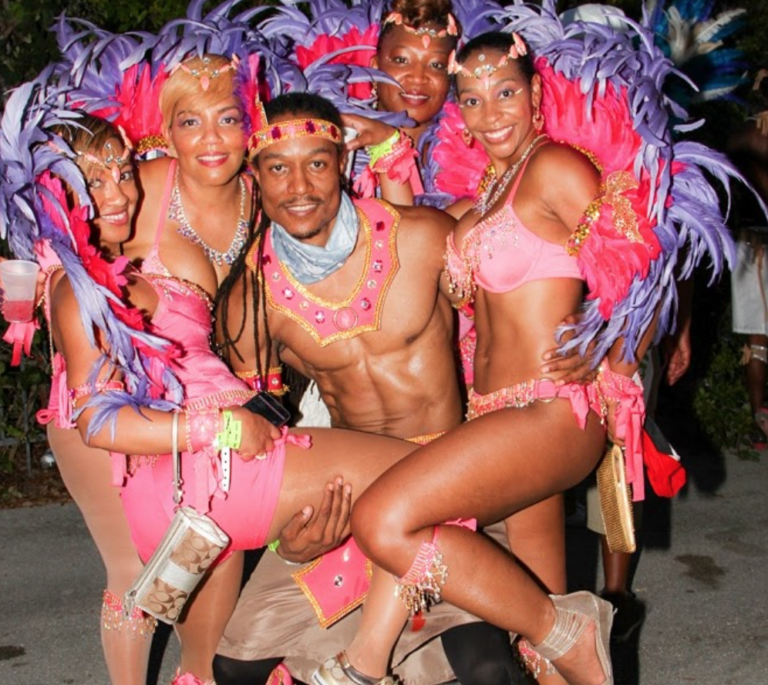
The friends that originally introduced me to carnival were guys from various islands who did not play mas at Miami carnival or Caribana (our 2 main destinations). The Trinis in the group would play mas when they went home for TNT carnival but that was about it. So for the first 15 years of my carnival life I was mainly feting, storming & liming. I had a ball the entire time, but because I had never played mas I did not REALLY understand what I was missing. Obviously I saw the costumes and pageantry but we stormed with the best of them, I was good.
2014 was filled with a couple of extremely tough situations for me personally. By August of that year for some reason I felt the need to go to Miami carnival and play mas. Maybe I had already heard enough about the release of pent up everything that people experience waiting all year to play mas, or maybe it was a build up of curiosity over the years pushed into action by a need growing desire to be happier. Whatever it was, I made the call to a group of female friends who we always hung out with and said this year I want to join the team on the road. It was late to be joining a band but they handled everything and that year I was on the road with Generation X. Simply put, finally playing mas after all those years of going to carnivals was like discovering the most fire secret VIP lounge in your favorite club. All that time I was so close but yet so far from the experience so many others were having. Clearly, playing mas is not for everyone but that day I found out I was born for this.
Eyes opened after finally playing mas I then became intent on not missing out of any of the carnival joy that others around me were experiencing anymore. That experience eventually forced me to re-evaluate my approach to the flag issue. It had become apparent to me that playing mas with energy infused by one’s national pride symbolized by a flag was the exclusive VIP room inside of the secret VIP lounge of carnival experience, and I wanted in. Being against something, which my rag represented, was not going to be enough anymore. I wanted the energy that came with being “for” something. So what was I “for” in terms of my identity? I grew up in a pro-black family and we fully believed that the Pan-African flag was the most complete representation of our identity in the world and in history. At that moment it became clear to me that I had two missions. First was to start representing myself, my family, and my community in the carnival world with the Pan-African flag. Second, was to have the Pan-African flag, which I had never seen at a carnival or fete before, more represented at carnivals.
4. Tell us about RBG Carnival, and "intersection of culture and cause".
RBG Carnival, LLC an independent section led by myself, Shujaa Smith, and Thesha Lashley was started in 2018 in Miami. RBG stands for Red, Black, and Green which is a reference to the colors of the Pan-African flag, which was created in 1920 by Marcus Garvey. The flag was created to identify the entire African diaspora at a time were there were only around three independent “black” nations in the world. We originally began as part of Fun Generation mas band, which ultimately collaborated with Party Room Squad mas, at Miami Carnival 2018. In late 2017, following my return from Uber Soca Cruise, the leaders of Fun Generation approached me with an opportunity to create a Pan-African themed section. I had been individually promoting the Pan African Flag, at every carnival I went to since 2016. Fun Generation allowed me to be on the band committee and lead the development of the section, as well as, contribute to the development of the bands entire 2018 portrayal.
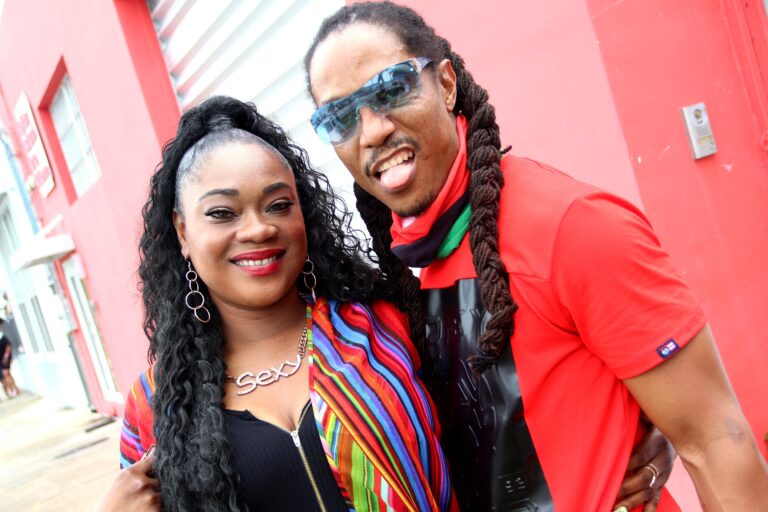
Arising was the name of our section, which signified the coming forth of what would become RBG Carnival and its mission. We had a great designer, she brought our concept to life in full Red, Black and Green color. We received so much attention on the road. Our small group of 25 masqueraders were asked to take well over 500 pictures by photographers, other masqueraders, and onlookers throughout the day who were drawn to the huge collection of large Pan-African flags we held high in the air at the parade. This became a movement to us that day with a mission to create a platform for carnival goers who are also drawn to the passion of the Pan-African unity and to also draw new people into the carnival culture. A month later we incorporated the company as an independent section and began planning for Miami Carnival 2019.
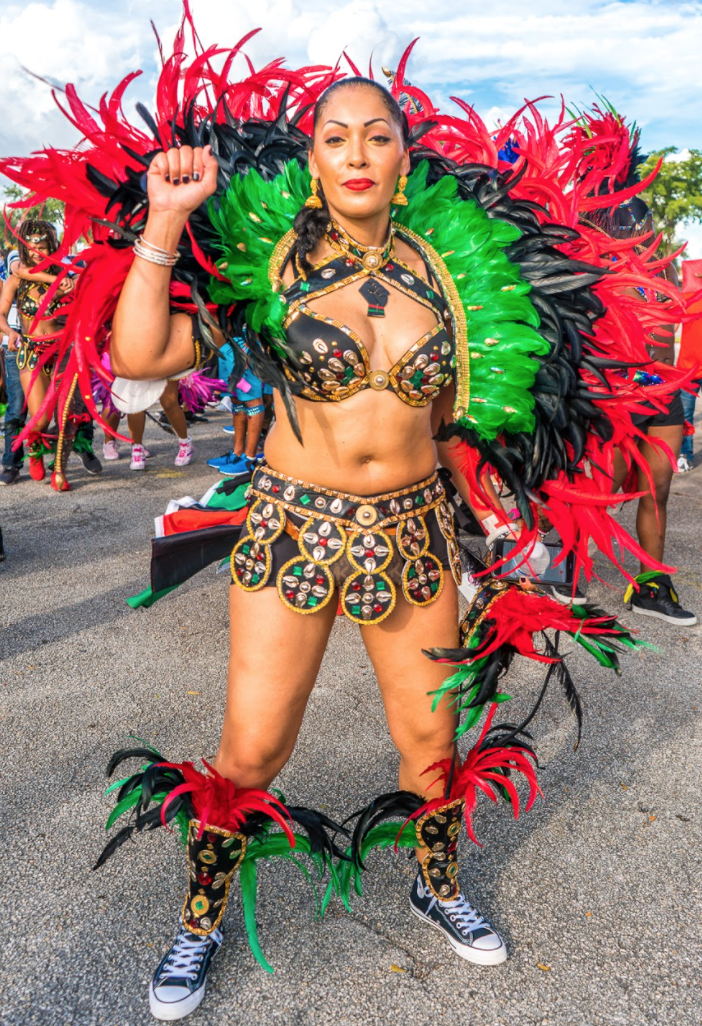
In 2019 at Miami, as an independent section with Party Room Squad, RBG Carnival became the first Pan-African based section to cross a stage at any carnival, anywhere, ever. Also our queen, Thesha, won Queen of the Carnival for Miami Carnival that year. “Hot Buttered Sou”l was our section portrayal with our gold based costumes branded with Pan-African colors and symbols throughout. Being an independent section for the first time was challenging, but we got it done and gained so much from the experience.
We realized what was drawing people to us and even what drew us together was this intersection of passions. RBG Carnival had found a space in the carnival world where people’s love of the carnival cultural was being expressed along with the Pan-African cause. The Pan-African flag is not an independence flag, it is a revolutionary flag; it is a call to action for the cause of Pan-African issues based in Pan-African pride and unity. What we had designated was the intersection of carnival culture and the Pan-African cause, for short “the intersection of culture and cause”. There is a sub-culture within the carnival community that already exists in the figurative “intersection”. We have now created is a place the caters to them where they can play mas “at the intersection” and where they can find others who are of a kindred spirit.
5. How important is it to you to see more African-Americans enjoying the carnival experience, and why?
I mentioned I had two missions, but actually I had a third priority as well, and that was to see people like me, African-Americans, substantially more represented in the carnival world. I have experienced carnival become increasingly inclusive with the explosion of carnival growth throughout the Caribbean, and around the world, but in particular here in the United States. Currently, there are over 100 carnivals in the States. While many people from all over the African diaspora have relatively recently come into the carnival world and have worked to establish their group’s niche, that is not so for African-Americans yet. There are so many of us out there that have no clue about the carnival culture, even though it is happening all around us.
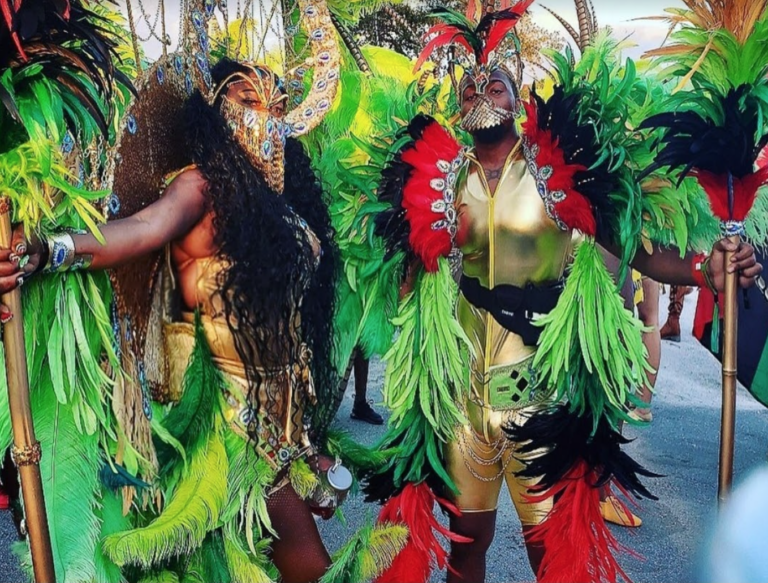
The carnival world has a vested interest in growing as well but, has yet to commit to or yet to figure out how to incorporate one of the largest group of Pan-Africans in the world. What is carnival if not a Pan-African celebration, a celebration of countries and people throughout the African diaspora that invites others from the outside to celebrate with us on our terms in our way. I believe my 20+ years evolving in this world has given me a solid perspective of what it might take to get there, as well as, the nature of the barriers that have prevented it from happening thus far.
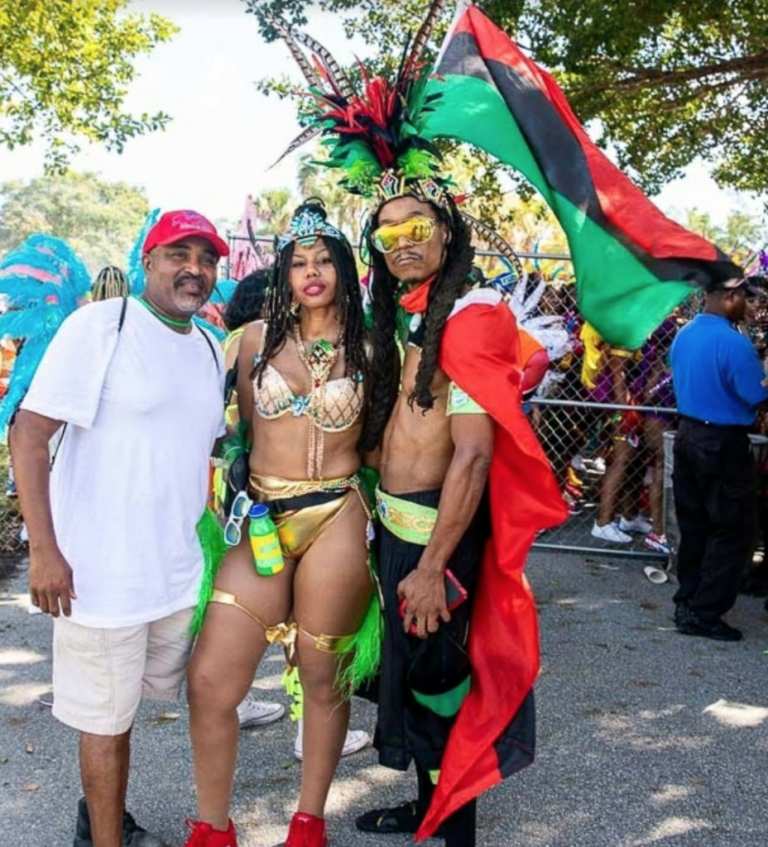
There is so much economic activity that takes place within the carnival world that for African-Americans to be on the outside looking in means being cut off from a major avenue of opportunity. It also means the great economic resources and platforms that African-Americans have are not being adequately shared with the carnival community. Take for instance the mutually beneficial situation when Verzuz, an African-American media company with a majority African-American viewership, used its platform to highlight dancehall culture with the Beenie vs Bounty clash. The current global consensus in the diaspora is that black economic power needs to be more consolidated, regardless of borders, and carnival has the ability to contribute greatly in this effort.
6. How is RBG Carnival thriving during the COVID-19 era?
Going into 2020, we intended to grow our section at Miami Carnival, as well as, expand our brand as either an independent section or as a full band to several other carnivals throughout the year. It was going to be sweet, our “coming out” year. Obviously due to COVID-19, however, those activities have been postponed. As a result, in 2020 we have worked continuously to maintain and strengthen existing relationships, as well as, develop new relationships with organizations and people within the carnival community. The goal has been to broaden our extended “family” with mutually beneficial relationships that align with our mission, which again is establish a platform where people can celebrate carnival culture and Pan-African pride together. As we enter the last quarter of the year we are working with that family to see what’s achievable and where in 2021. Stay tuned!
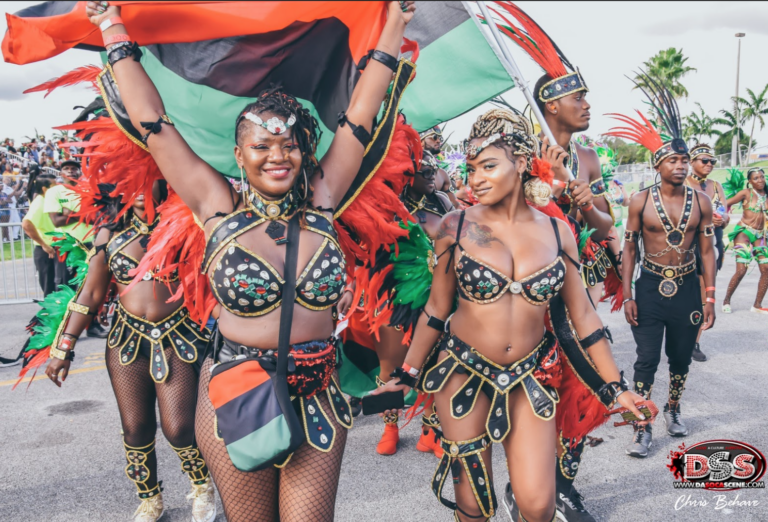
I want to add that as much as COVID-19 has impacted 2020, so has “The Great Awakening” of Black consciousness worldwide. The energy coming from the mass rejection of the status quo by black people resonates with our mission. As I have stated, one of our goals is to increase the presence of the Pan-African flag, which symbolizes Pan-African liberation, in the carnival world. My Friend Blacksani, a Trinidadian Soca artist we started working with in 2019 said, we want to provoke people to ask the question “What is RBG?”. Asking the question is the first step to exposing one’s self to the history and the current relevance of the Pan-African flag and everything which it stands for. For those that already know, we want to bring them together not just to fete but to use our collective strength to further the cause in our communities. We want to demonstrate the ability of the carnival community to be a powerful force during this “Great Awakening”.
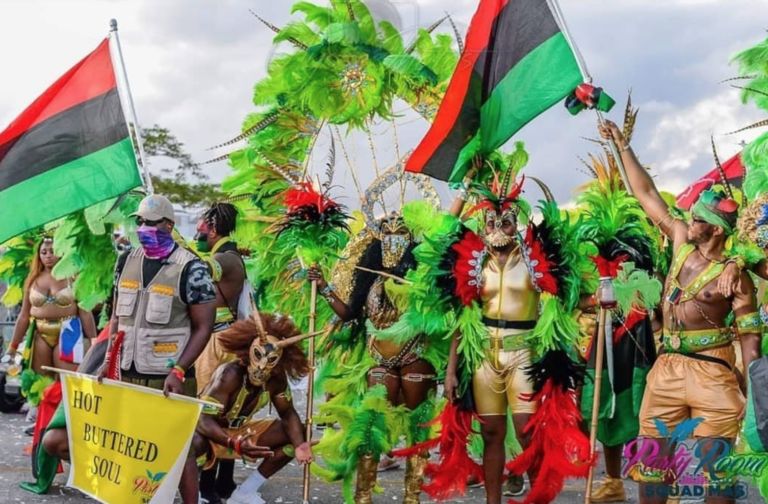
7. What advice would you have for people looking to get into being an independent section leader?
I would say what I have done is place my passions at the center of my business model and built a strategy outwards from there. The passions being the carnival culture and Pan-African pride. The strategy being to represent both to the fullest, then find others who feel similarly, as well as, introduce it to others for the first time. I believe a person should live the brand before anything. From early, anyone who was around me in a fete, on the road, at a jouvert, on Uber, etc. knew that I was that guy whining on everything and they also knew that I was that guy repping that RBG flag. Nothing has changed since early, there’s just more of us now. Lastly, I would ask them to come fete with us at the intersection.
How to Find RBG Carnival
Follow RBG Carnival on Instagram
AWM Thanks you!
Shu!!!! Thank you so much for your time and engaging discussions about culture and cause. Your energy for the cause and culture is infectious and inspirational. Looking forward to more discussions and seeing you on the road.

